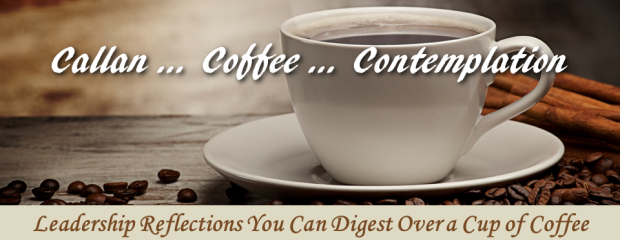Callan…Coffee…Contemplation for the Week of June 1st
Service
What do you need to do?
Do what needs doing!
The Paradox of Character
When we think of our growth as leaders we tend to focus on happiness. We dream of who we may be someday, what we might achieve, and the roles and titles we may earn. And thus we seek ways to get this happiness. But here’s the paradox: When I look back over the arc of my life, I find the opposite to be true. The events shaping me most were often those that broke me. It was the ordeal–the tests and trials—that was most profound in etching my character and forming my nature. Isn’t that interesting; we aim for happy, yet we end up being formed most by failure and sacrifice. The pursuit of happiness doesn’t form our character; the experience of, and conversion through, sacrifice and grit, does. It seems to me that pursuing happiness leads only to temporary satisfaction, whereas the experience of sacrificing for some deeper purpose, and surviving the crucible of the pursuit, is the real road to depth of character. Timeless truths are often paradoxical, and such is the case with character: The road to depth is not smooth, but rugged.
Breaking Bread
A great team, whether in sports or the workplace, is experienced by its members as a community. Every excellent organization I’ve been part of felt like the close-knit neighborhood of my youth; deeply personal, alive with camaraderie, and rich in mutual affection. Which got me thinking: How does this feeling of community arise? I think it is cultivated through shared sacrifice towards common purpose, shared peak experiences, and the regular celebrating of kindred feelings. We bond deeply when we strive together and when we celebrate this striving through breaking bread together. Yes; eating and drinking in a social setting. When we gather to eat and drink together, there is formed a quality of relating far deeper, and more robust, than mere casual workplace relations. This insight is crucial for leaders, because leaders must intentionally create conditions allowing for shared purpose and common sacrifice for higher ends, and then the cultivation of mutual affection through breaking bread. Much goodness comes at the dining table, and deep bonds grow over the sharing of food and a cold pint.
Universal Truths
I am often asked why I use mythology, history, parable, and classic hero tales in my leadership teaching. I do so because this method helps me understand universal truths of life and leading. Throughout recorded human history, and regardless of time or culture, humans have told the story of development, growth, and transformation essentially the same way. Yes, each culture dresses its heroes in unique costumes and calls them unique names, but the basic theme of the hero path is the same. When we see this pattern we begin to understand this key insight: all problems are essentially the same problems. Understood correctly as metaphor, we can see Lincoln in Odysseus; Martin Luther King in Theseus; modern politicians falling from grace like Icarus; or the common hero path walked by Gandhi and Aung San Suu Kyi, though separated by many decades, gender, and race. Universal truths revealed through specific cases. And why is this important to us? Because heroic tales of timeless excellence can raise our spirits, and elevate our ambitions, even today.
Check back next Monday for a round up of this week’s social media shares. Or check us out on Facebook, Twitter, Google+, or Pinterest to see our posts every day!
Tweet Share






